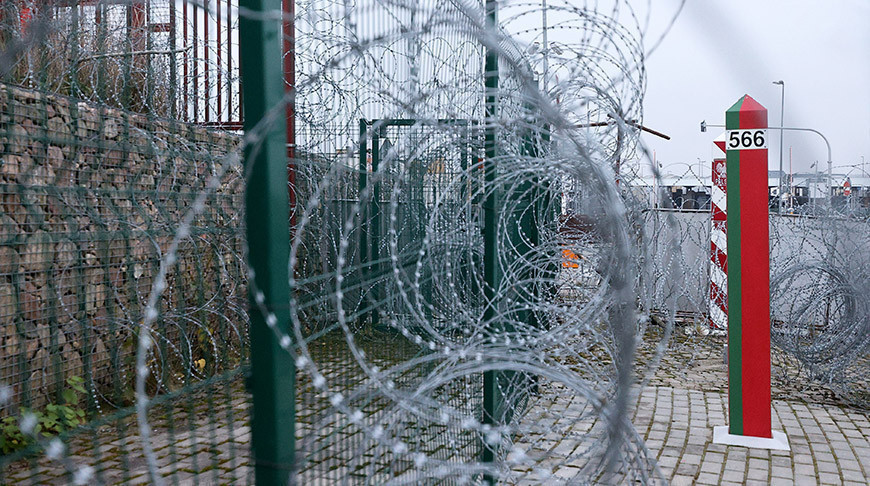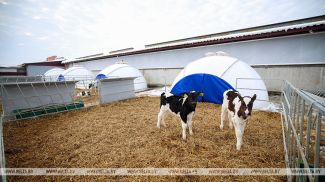
An archive photo
MINSK, 15 September (BelTA) – The unfriendly policy of the West toward Belarus and Russia is turning openly aggressive, Belarusian President Aleksandr Lukashenko said in an interview with the Russian magazine Razvedchik, BelTA has learned.
The head of state was asked about Minsk's response if Poland and the Baltic countries followed through on their stated intention to mine their borders with Belarus.
“Such statements reflect the overall Western policy toward Belarus and Russia. And the saddest part is that this policy doesn’t change,” Aleksandr Lukashenko said. He noted that it has been 80 years since the end of World War II, yet the West still sees Belarus, Russia, and their alliance as a threat.
“Under this pretext, NATO is rapidly arming Europe. Poland and the Baltic states are, in order to please their ‘masters’, inventing so-called ‘defensive’ measures. One of them is withdrawing from the Ottawa Treaty and mining the border with Belarus. All of this is merely another attempt to exert pressure on Belarus,” the president said.
“The West’s unfriendly policy toward us is turning openly aggressive,” the Belarusian leader emphasized. “For now, we don’t see any serious risks or direct military threats, since anti-personnel mines are a defensive type of weapon. Especially considering we have no plans to cross our neighbors’ borders uninvited.”
Aleksandr Lukashenko has once again expressed Belarus' readiness to be friends and cooperate with anyone who truly desires it, but to go wherever they are welcome “not on tanks, but on tractors.”
At the same time, the actions of neighboring countries on the western borders are unlikely to contribute to regional security and stability. “Why mine borders today, spend millions on building iron fences that migrants can overcome in mere minutes?” the president asked rhetorically. “Millions of dollars have been invested, half of it stolen, borders are being mined, armies are being pumped with troops and equipment, but what’s the result? Who benefits from this?”
Such madness is, above all, dangerous for those who initiate it, the Belarusian leader believes. “Fortunately, ordinary people understand this and oppose these reckless actions [for example, 54% of Poles hold similar views, according to one poll],” he remarked. The president noted that the sanctions imposed on Russia and Belarus have also had a negative impact on the lives of Poles, Lithuanians, and Latvians. They have faced rising energy prices, the loss of traditional markets, and decreased budget revenues. “Time has shown that sanctions backfire,” Aleksandr Lukashenko stressed.
“However, among the leaders of Poland, Lithuania and Latvia, political ambition seems to outweigh common sense,” the Belarusian president said. “Defense budgets in those countries are already close to 5% of their GDP, while in Belarus it's no more than 1%. Ordinary people have to pay for all this, and their social welfare, along with their hope for a better life, is fading every day. But nobody seems to think about them or the consequences of such reckless decisions.”
The president emphasized that Belarus and the Belarus-Russia Union State are monitoring developments along the western borders and will swiftly respond to any direct threat to Belarusian territory. “If they move from words to actions, it won't end well. We have everything necessary to inflict unacceptable damage on an aggressor. I wouldn't recommend testing us,” he warned. “But neighbors aren't chosen; they're given by God. We always offer good-neighborly relations. But they refuse and do unacceptable things at the border.”
The head of state was asked about Minsk's response if Poland and the Baltic countries followed through on their stated intention to mine their borders with Belarus.
“Such statements reflect the overall Western policy toward Belarus and Russia. And the saddest part is that this policy doesn’t change,” Aleksandr Lukashenko said. He noted that it has been 80 years since the end of World War II, yet the West still sees Belarus, Russia, and their alliance as a threat.
“Under this pretext, NATO is rapidly arming Europe. Poland and the Baltic states are, in order to please their ‘masters’, inventing so-called ‘defensive’ measures. One of them is withdrawing from the Ottawa Treaty and mining the border with Belarus. All of this is merely another attempt to exert pressure on Belarus,” the president said.
“The West’s unfriendly policy toward us is turning openly aggressive,” the Belarusian leader emphasized. “For now, we don’t see any serious risks or direct military threats, since anti-personnel mines are a defensive type of weapon. Especially considering we have no plans to cross our neighbors’ borders uninvited.”
Aleksandr Lukashenko has once again expressed Belarus' readiness to be friends and cooperate with anyone who truly desires it, but to go wherever they are welcome “not on tanks, but on tractors.”
At the same time, the actions of neighboring countries on the western borders are unlikely to contribute to regional security and stability. “Why mine borders today, spend millions on building iron fences that migrants can overcome in mere minutes?” the president asked rhetorically. “Millions of dollars have been invested, half of it stolen, borders are being mined, armies are being pumped with troops and equipment, but what’s the result? Who benefits from this?”
Such madness is, above all, dangerous for those who initiate it, the Belarusian leader believes. “Fortunately, ordinary people understand this and oppose these reckless actions [for example, 54% of Poles hold similar views, according to one poll],” he remarked. The president noted that the sanctions imposed on Russia and Belarus have also had a negative impact on the lives of Poles, Lithuanians, and Latvians. They have faced rising energy prices, the loss of traditional markets, and decreased budget revenues. “Time has shown that sanctions backfire,” Aleksandr Lukashenko stressed.
“However, among the leaders of Poland, Lithuania and Latvia, political ambition seems to outweigh common sense,” the Belarusian president said. “Defense budgets in those countries are already close to 5% of their GDP, while in Belarus it's no more than 1%. Ordinary people have to pay for all this, and their social welfare, along with their hope for a better life, is fading every day. But nobody seems to think about them or the consequences of such reckless decisions.”
The president emphasized that Belarus and the Belarus-Russia Union State are monitoring developments along the western borders and will swiftly respond to any direct threat to Belarusian territory. “If they move from words to actions, it won't end well. We have everything necessary to inflict unacceptable damage on an aggressor. I wouldn't recommend testing us,” he warned. “But neighbors aren't chosen; they're given by God. We always offer good-neighborly relations. But they refuse and do unacceptable things at the border.”












